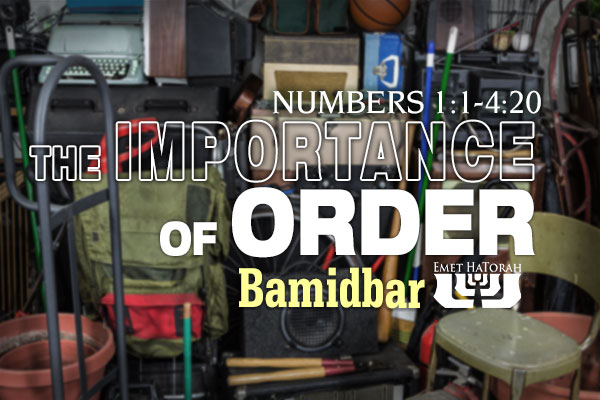Parashat Bamidbar - Numbers 1:1-4:20
Series:

Parashat Bamidbar, the first portion of the book of Bamidbar, often gets a bad rap. The bulk of it is filled will the results of a national census, the arrangements of the tribal encampments, and the duties of the Levites and Kohanim. For many people this material doesn’t hold their attention. They are looking for something they can “sink their teeth into.” But reading the Torah and understanding its principles takes more than a casual reading. Parashat Bamidbar is one of these portions that beg us to peer deeper into it to see meaning and application. Besides the obvious and practical instructions given to the Children of Israel regarding their encampment and responsibilities, the fact that these seemingly mundane details were recorded and preserved for us in the Holy Scriptures should inform us of their importance. We have to stop and ask questions that help us dig into the text on a deeper level. One of the lessons we can learn from this week’s portion can be found in an interpretation of the midrash presented by the mussar masters. The midrash tells us:
When the Holy One, blessed be He, told Moses, “Organize them [Israel] under standards in accordance with their desire,” [Numbers 2:2] Moses began to feel distressed. He thought, “Now strife will arise among the tribes; for if I bid the tribe of Judah camp on the east side of the Tabernacle and he says, ‘I will accept only the south,‘ and the same applies to Reuben and the same to Ephraim and to each of the other tribes, what am I to do?” (Bamidbar Rabbah 2:8)
Mussar teachers use this example from the midrash to instill within their students the importance of order. Why did Hashem give them specific instructions about how to arrange themselves around the Tent of Meeting? Why didn’t He just leave the choice of the encampments up to the tribes without having to assign them each to a specific area? The answer has to do with the character of the LORD. It is in His very nature to rule the universe with order. He is the one who distinguishes one day from another, and sets the sun, stars, and planets in motion. He is the one who has created the cycles of life, the seasons of the year, and even the laws of the universe. Hashem is a God of order. Everything He does involves order and structure.
The reason Hashem assigns each tribe to a particular encampment is that He wants to teach the children of Israel about the importance of order. In this passage, Moses is concerned that when he assigns the tribes their encampment positions they will argue with him about their assignments. Why does he think this? Because it is human nature to resist imposed order. Although structure and order come natural from some, for most people it doesn’t come without a fight. However, when we work to have order in our lives, it has the ability to transcend the routine and produce spiritual fruit in our lives.
The teachers of mussar see the character trait of order like a clasp on a necklace of expensive pearls. Although the clasp is the least noticed and least appreciated component of the necklace, if it becomes detached and all of the pearls fall to the ground, its importance will be immediately recognized. However, if the clasp holds, the necklace is preserved along with its beauty.
One of our tasks is to imitate Hashem. There are certain things we can do that imitate Hashem’s character trait of order. For instance, when we light candles and say a blessing over wine and bread to begin Shabbat or a festival we are creating order. When we light a multi-wick candle, and say blessings over wine and special spices at the end of Shabbat to make a distinction between the seventh day and the rest of the week we are creating order. When we wake up and give thanks to our Maker before starting our day, we are creating order. There are a multitude of examples that can be listed. However, the principle is that any time we make space for order and structure in our lives we are able to see beyond the confusion and disorder of life and peer into the character of Hashem.








